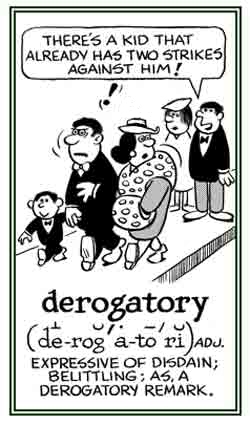de-
(Latin: from, away from, off; down; wholly, entirely, utterly, complete; reverse the action of, undo; the negation or reversal of the notion expressed in the primary or root word)
2. A reference to tendencies to diminish the merits or reputations of people or things: The Republican candidates have been making too many derogatory remarks about each other which provides the Democrats with all kinds of reasons for the voters not to vote for any Republicans.



Go to this Word A Day Revisited Index
so you can see more of Mickey Bach's cartoons.
2. The removal of dissolved salts from seawater and in some cases from the brackish waters of inland seas, highly mineralized ground waters; such as, geothermal water that is saturated or strongly impregnated with salt, and municipal waste waters.
The process of desalination includes removal of dissolved salts from sea water and from the salty waters of inland seas, highly mineralized ground waters, and municipal waste waters.
The process of desalinationmakes such otherwise unusable waters fit for human consumption, irrigation, industrial applications, and for other purposes.
Distillation, or condensation from a vapor, is the most widely used desalination process; freezing and thawing, electrodialysis, and reverse osmosis are also used. All are energy-intensive and therefore expensive; so, for this reason, it is generally used only where sources of fresh water are not economically available.
Currently, more than two billion gallons (eight million cubic meters) of fresh water are produced each day by several thousand desalination plants throughout the world, the largest producers are apparently are in the Arabian Peninsula.
2. Any of various methods used to remove mineral salt from ocean water or other brines; such as, flash desalting, reverse osmosis, or electrodialysis.
2. To slope, to extend, or to incline downward: The visitors descended down to the river on the path.
3. To come from an ancestor or ancestry: Hank said he was descended from a pioneer family.
4. To come down from a source; to derive: The traditions of some people have descended from ancient customs.
5. To pass by inheritance: Mack's house is said to have descended through four generations.
6. To proceed or to progress downward, as in rank, pitch, or scale: The various states of America on the list are descending according to their populations.
7. To arrive or to attack in a sudden or an overwhelming manner: The summer tourists are suddenly descending on the seashore village.
2. A condition of falling, dropping, or moving in a downward manner: All the passengers in the airplane had their seat belts on in preparation for the descent to the landing strip at the airport.
3. A person’s ancestry in terms of relatives or place of birth: Nadine was the only exchange student of German descent who was attending the high school in California for the period of a year.
4. A social or moral decline into a particularly ill-favored situation: The plight of losing his children in the car accident drove Sam into a descent of madness and self-destruction.
5. A violent attack or invasion: During the summer, there was a sudden descent of grasshoppers in the fields of grain and the farmers were completely helpless in trying to save any of their crops.
6. A decline in value or station of life: After Thomas lost his job at the factory, and not being able to find another one, his family experienced a descent into poverty during the following year.
2. To give a detailed, or graphic, account of by giving details of its characteristics.
3. To give an account of in speech or writing.
4. To convey an idea or impression of something or to characterize it.



